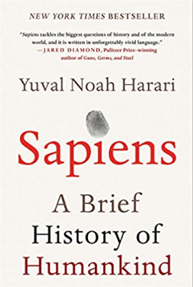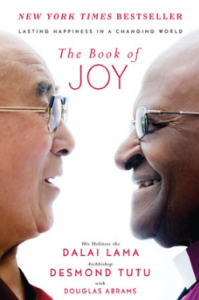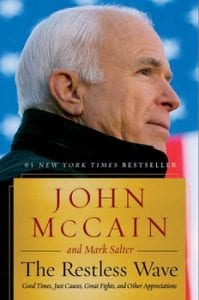The introduction to Fundamental Challenges to Global Peace and Security: The Future of Humanity begins, “world society faces immediate and long-term threats to peace and security” (Mahmoudi et al., 2022, 1). Given the current combative climate in the world, these words feel all the more hauntingly prescient.
Category Archives: Reviews
Book Review: The Restless Wave: Good Times, Just Causes, Great Fights, and Other Appreciations
In the summer of 2018, while battling brain cancer, Arizona Senator John McCain released a book in the midst of a particularly chaotic and toxic political atmosphere. The book, The Restless Wave, serves as a powerful meditation on the future of America as an identity and an ideal; the critical need for compromise and civil discourse; and the need for the propagation of spiritual values such as humility, grace, courage, and justice both among our political leaders and the American people.
McCain’s parting advice cautions against the excesses of partisan entrenchment, righteous and arrogant discourse, and a xenophobic and exclusive definition of America. His principled guidance should be carefully considered by all Americans concerned about the unprecedented and unsettling denigration of truth, unity, civility, and community in our country. Continue reading
Book Review: The History of Humankind
 Yuval Noah Harari’s, Sapiens: A Brief History of Humankind, is an exceedingly unique and captivating read primarily because of its brevity. In a mere 400 pages, Israeli historian Harari presents and analyzes over 50,000 years of human history. Continue reading
Yuval Noah Harari’s, Sapiens: A Brief History of Humankind, is an exceedingly unique and captivating read primarily because of its brevity. In a mere 400 pages, Israeli historian Harari presents and analyzes over 50,000 years of human history. Continue reading
Book Review: Searching for Meaning
It’s hard to remember that our lives are such a short time. It’s hard to remember when it takes such a long time.” – Isaac Brock
Book Review: The Book of Joy

Great Minds
Eleanor Roosevelt encouraged people to hold elevated conversations. She once said that “great minds discuss ideas; average minds discuss events; and small minds discuss people.” I have not heard a more elevated conversation than the week-long discussion between the Dalai Lama and Archbishop Desmond Tutu documented in vivid detail in The Book of Joy by Douglas Abrams. Continue reading
Book Review: A Book for Our Times
A Book for Our Times
The white working class – this demographic group claimed center stage in American political discourse over the past year. I often see them dismissed as backwards, uneducated conservatives. Alternatively, we offer trite solutions for their plight without fully comprehending the problem. Continue reading
Book Review: The Risks of Righteous Fury
Book Review: The Risks of Righteous Fury
This is a book review of The Righteous Mind by Jonathan Haidt. The review was written by Vicky Yu.
Morality and common sense suffer from the same underlying assumptions; we believe that people all abide by the same principles. Experience teaches us that common sense is not universal, but accepting the same verdict on morality is more difficult. Acknowledging differences in how we determine right versus wrong fundamentally alters perceptions of who we are and our place in the world. Continue reading
Book Review: Little Brown Me, and Other Reflections on Identity
Are we as adults prepared to help the children we care about make sense of their own race-related observations?
This is a book review of Why are all the Black Kids Sitting Together in the Cafeteria by Beverly Daniel Tatum. The review was written by Brandie Williams.
In this thought-provoking work, Why are all the Black Kids Sitting Together in the Cafeteria, Beverly Daniel Tatum weaves together a conscious-jolting web of understanding surrounding privilege, racial identity, and how we come to understand who we are as individuals. In the very beginning of her book, she challenges us with a simple exercise: “think back to your earliest race-related memory.”
Book Review: How to Rescue Those Who the System Fails
This is a book review of Just Mercy by Bryan Stevenson. The review was written by Esther Kaufman.
“Mercy is most empowering, liberating and transformative when it is directed at the undeserving,” writes author Bryan Stevenson in his book, Just Mercy. This is a concept that is difficult but perhaps essential to embrace as the media constantly divides people and societies into heroes and villains. I was born to immigrant parents who fled anti-Semitism and praise America as the land that gave their families mercy when no other state could. Yet, Bryan Stevenson’s portrayal of the American criminal justice system revealed injustices that disrupted all of my preconceived notions regarding America’s inherit goodness. Continue reading
Book Review: Unforgiveness is an Option?
Book Review of “Trauma and Forgiveness: Consequences and Communities” by C. Fred Alford. The review was written by Brandie Reeder Williams.
Having grown up in what is affectionately known as the “bible belt” of rural North Carolina, the virtue of “forgiveness,” was always a taken-for-granted concept, one cloaked in the easy black-and-white morality of “right and wrong.” My orientation to, and understanding of forgiveness, was espoused through both myth (“forgive others or God will not forgive you in heaven,”) but also through folklore and narrative; through cautionary tales told about people who just “couldn’t forgive…got sick, and died.” Forgiveness then, was in every situation both a moral obligation and beneficial to one’s own “healing,” physically and emotionally. Continue reading
Book Review: Ethics by Baruch Spinoza
Sometimes you finally get to read that book that makes things fall into place. No matter how much modern philosophy you read, without tracing those thoughts back to their place of origin, you will miss a lot. And who would have thought that this little book by Spinoza (1632-1677), who was ostracized for thinking outside of the limits the religious community he grew up in had put on him, would be such an eye-opener? Nowadays Spinoza’s work is an inspiration not only for philosophers, but also across different religious communities. In 1929 Einstein wrote “I believe in Spinoza’s God.” [Source] So why is Spinoza’s legacy still such an inspiration today? Continue reading
About ‘Book reviews’
“If you only read the books that everyone else is reading, you can only think what everyone else is thinking.” ~ Haruki Murakami, Norwegian Wood
The book reviews on the blog will feature important books related to the Chair’s research themes, both academic and non-academic texts. The reviews will focus on what the reader found inspiring, what questions the book raised and how it has influenced their approach. Continue reading

